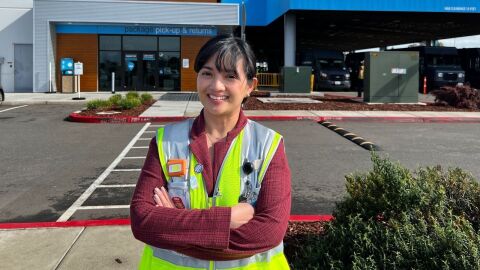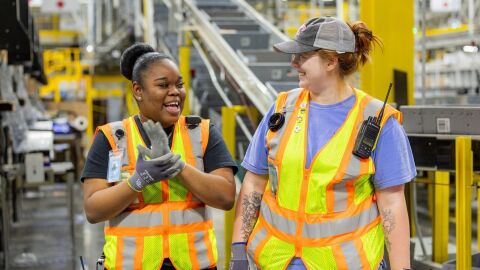In 2017, the Amazon Veteran Technical Apprenticeship (AVTA) program started in Seattle with a small cohort of veterans looking for new careers. The cohort was made up of veterans including a former combat medic, military signal support, and an engineering dive officer.
The AVTA program is divided into two section of training. The veterans started by entering into intensive classroom training with Apprenti and then moved into on-the-job, paid apprenticeships with Amazon. This model fills in key technical skill gaps and offers participants an opportunity to learn on the job in high-demand fields.
In August 2018, the first graduating cohort of on-the-job apprentices became full-time Cloud Support Associates at Amazon.
We sat down with Joshua Tanton, one of those new graduates, to ask him about the program and why it is important for veterans and military spouses.
The classroom training gave me a solid foundation, helping me feel confident that I could succeed throughout on-the-job training.
The AVTA program allows veterans and military spouses to gain in-demand technical skills in areas like cloud computing, software engineering, and solutions architecture. What led you to Amazon and the AVTA program?
I had to leave the workforce in 2011 to focus on healing from injuries caused during my military service. In 2017 I was ready to work again but I didn't know where to begin. Being out of the information technology field for six years is equivalent to a spending lifetime away. I asked myself, “Do I go back to school or do I find a job right away?” I felt lost. I was researching jobs online and came across an article announcing the launch of the Amazon Veteran Technical Apprenticeship program. Immediately, I knew this was the direction I wanted to go.
What’s the training like during the weeks of classroom learning?
To make it through the classroom training I needed to absorb a large amount of information in a short period of time. I spent eight hours a day learning all that I could. Then I would come home and study. I like to compare it to that last-minute studying for finals. The classroom training gave me a solid foundation, helping me feel confident that I could succeed in on-the-job training.
Tell us about the on-the-job training and working with a team of professionals to learn.
On-the-job training was fun! I was able to build on the foundation I gained from the classroom training. I was still taking in vast amounts of information, but now I had the time to build, break, and learn to troubleshoot systems within AWS. My team played a key role in my success. They were both patient and tough throughout my OJT allowing me room to grow. There were times when I felt like I didn’t know if this career was right for me, but my team (my manager and my peers) were always there for me. They encouraged me keep going – and look where I am now!
What’s the atmosphere like working with a veteran cohort throughout the training?
When you stick veterans into a fast-paced, demanding environment we are going to come together to succeed as a team. We pushed each other and formed friendships that are strong to this day. We are a team, we are there for one another no matter what.
How do you foresee these skills impacting your future career?
The apprenticeship has given me the tools and knowledge I need to be marketable in today's workforce. Before the apprenticeship, I did not know where to begin. I thought I would have a very difficult time competing in today's fast-paced tech world. Now, I hold multiple IT and AWS certifications, and feel confident that I have the skill set necessary to have a successful career.
Do you have any tips for veterans heading into their transitions to civilian life? Any advice for veterans who may have been in a similar situation as yourself?
Transitioning to civilian life is not easy – just thinking about it can become overwhelming. I encourage people to take a breath and think about what it is that truly makes them happy. Then make a plan of action and stick to it. Remember that plan when you hit your first obstacle! Finally, surround yourself with people who will support you... and listen to them.
















